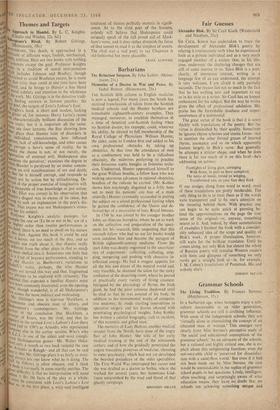Fair Guesses
Alexander Blok, By Sir Cecil Kisch. (Weidenfeld and Nicolson, 21s.) SIR CECIL KISCH has undertaken to trace the development of Alexander Blok's poetry by relating it continuously with what he experienced both as a private individual and as a very much engaged member of a society that, in his life- time, underwent the shattering changes that are still of some interest to us. Since Blok is a poet, clearly, of enormous interest, writing in a language few of us can understand, the attempt is very welcome. I am afraid it only partially succeeds. The reason lies not so much in the fact that be has nothing new and important to say as in his style as a writer. Sir Cecil has an honest enthusiasm for his subject. But the way he writes gives the effect of professional adulation. His praise has the formidable deadness and unper- suasiveness of a testimonial.
The great virtue of the book is that it is sown thickly with translations of the poetry. But the virtue is diminished by their quality. Sometimes he ignores rhyme schemes and stanza forms—not to mention the other formal graces of internal rhyme, assonance and so on which apparently feature largely in Blok's verse. But generally he attempts a stricter shape, and when he does there is far too much of it on this level—he's addressing an actress: Footlights of living glow, cnringing With flame, to part us have conspired; The notes of music, round us winging, Transformed you, as your face they fired.
If one stodges along from word to word, most of these translations are pretty intolerable. The only thing to do is to treat them as if the words were transparent and to fix one's attention on the meaning behind them. With practice one can begin to be quite quick at guessing be- hind the approximations on the page the true sense of the original—or, anyway, something nearer ,to it. And, indeed, by sheer accumulation of examples 1 finished the book with a consider- ably enhanced idea of the scope and quality of Blok's work. A proper illumination, however, still waits for the brilliant translator. Until he comes along, not only Blok but almost the whole of Russian poetry will tantalise Western readers with hints and glimpses of something we only rarely get a straight look at—in, for example, J. M. Cohen's translations of Pasternak. His and nobody else's.
NORMAN MCCAlci


























 Previous page
Previous page